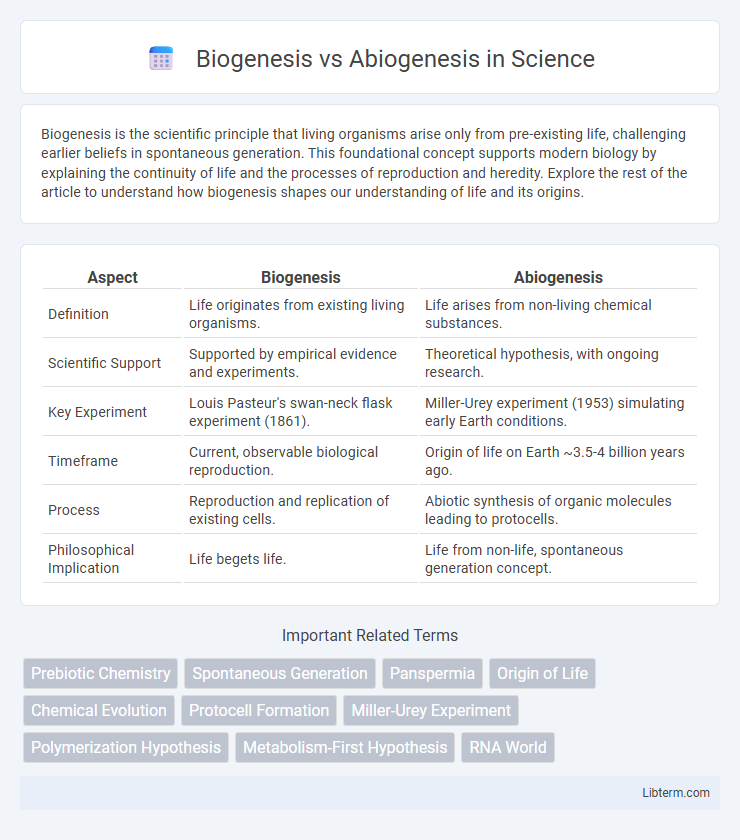Biogenesis is the scientific principle that living organisms arise only from pre-existing life, challenging earlier beliefs in spontaneous generation. This foundational concept supports modern biology by explaining the continuity of life and the processes of reproduction and heredity. Explore the rest of the article to understand how biogenesis shapes our understanding of life and its origins.
Table of Comparison
| Aspect | Biogenesis | Abiogenesis |
|---|---|---|
| Definition | Life originates from existing living organisms. | Life arises from non-living chemical substances. |
| Scientific Support | Supported by empirical evidence and experiments. | Theoretical hypothesis, with ongoing research. |
| Key Experiment | Louis Pasteur's swan-neck flask experiment (1861). | Miller-Urey experiment (1953) simulating early Earth conditions. |
| Timeframe | Current, observable biological reproduction. | Origin of life on Earth ~3.5-4 billion years ago. |
| Process | Reproduction and replication of existing cells. | Abiotic synthesis of organic molecules leading to protocells. |
| Philosophical Implication | Life begets life. | Life from non-life, spontaneous generation concept. |
Introduction to Biogenesis and Abiogenesis
Biogenesis is the scientific theory stating that living organisms originate only from existing living organisms, supported by extensive experimental evidence such as Louis Pasteur's experiments disproving spontaneous generation. Abiogenesis refers to the natural process by which life arises from non-living matter, hypothesized to have occurred on early Earth through chemical evolution over millions of years. These contrasting concepts form the foundation of understanding life's origin, with biogenesis emphasizing continuity of life and abiogenesis exploring life's primordial emergence.
Historical Perspectives on the Origin of Life
Biogenesis, the principle that life arises from existing life, has its roots in experiments by Louis Pasteur in the 19th century that disproved spontaneous generation, while abiogenesis hypothesizes life's emergence from non-living matter through natural processes. Early scientific discourse, dating back to Aristotle, largely supported spontaneous generation until technological advancements enabled empirical testing, shifting consensus towards biogenesis. Modern research in abiogenesis explores chemical evolution and primitive Earth conditions to understand how life could have originated from inorganic compounds.
Key Principles of Biogenesis
Biogenesis is grounded in the principle that life arises only from pre-existing life through reproduction, emphasizing continuity in biological development. This theory contrasts with abiogenesis, which posits that life can emerge spontaneously from non-living matter under certain conditions. The key principles of biogenesis include cellular continuity, genetic inheritance, and the impossibility of spontaneous generation, demonstrated through Pasteur's experiments that disproved life arising from non-living material.
Core Concepts of Abiogenesis
Abiogenesis refers to the natural process of life arising from non-living matter, typically through chemical reactions that create simple organic molecules and gradually increase complexity to form primitive life forms. Core concepts include the formation of basic biomolecules like amino acids and nucleotides, the synthesis of self-replicating molecules such as RNA, and the development of protocells with membrane-like structures capable of maintaining internal environments. Abiogenesis contrasts with biogenesis, which is the principle that life arises only from existing life, emphasizing the spontaneous origin of life in early Earth's conditions.
Major Scientific Experiments and Evidence
Major scientific experiments supporting biogenesis include Francesco Redi's 17th-century meat and maggot study disproving spontaneous generation, and Louis Pasteur's 19th-century swan neck flask experiments demonstrating that microorganisms arise from existing life. Abiogenesis research involves Miller-Urey's 1953 simulation of early Earth conditions, producing amino acids from inorganic compounds, and subsequent studies on hydrothermal vent environments suggesting plausible pathways for life's chemical origins. Together, these experiments provide critical evidence about life's origin, distinguishing between life from pre-existing organisms and life arising from non-living matter.
Contrasting Biogenesis and Abiogenesis Theories
Biogenesis states that living organisms arise from pre-existing life, supported by experiments like Pasteur's swan-neck flask test disproving spontaneous generation. Abiogenesis proposes life originated from non-living matter through chemical processes on early Earth, relying on hypotheses such as the primordial soup theory and hydrothermal vent environments. These contrasting theories differ fundamentally on the origin of life, with biogenesis emphasizing continuity of life and abiogenesis focusing on life's emergence from inorganic compounds.
Modern Discoveries Influencing the Debate
Recent advances in genomics and synthetic biology have shed new light on the biogenesis versus abiogenesis debate by providing evidence of life's complex molecular origins and potential pathways for life's emergence from non-living matter. Discoveries such as ribozymes capable of self-replication and the formation of protocells under prebiotic conditions support abiogenesis theories, demonstrating plausible mechanisms for life arising spontaneously. Modern analytical techniques revealing ancient microbial fossils and isotopic signatures further influence interpretations of early life, bridging gaps between theoretical models of life's genesis and empirical data.
Implications for the Search for Extraterrestrial Life
Biogenesis asserts that life arises only from existing life, implying that discovering extraterrestrial organisms may require identifying habitats with conditions supporting ongoing life cycles. Abiogenesis suggests life can originate spontaneously from non-living matter under suitable conditions, expanding potential extraterrestrial environments to those with prebiotic chemistry. This distinction shapes astrobiological strategies, influencing the search for biosignatures versus prebiotic markers on planets and moons.
Philosophical and Theological Considerations
Biogenesis, asserting that life arises only from existing life, aligns with many theological perspectives emphasizing divine creation and continuity of life's essence. Abiogenesis proposes life from non-living matter, challenging traditional beliefs by suggesting natural processes as the origin, raising philosophical questions about the nature of existence and the role of a creator. Both concepts provoke ongoing debates in philosophy and theology concerning the origins of life, purpose, and the intersection of science and faith.
Future Directions in Origin of Life Research
Future directions in origin of life research emphasize integrating advancements in synthetic biology, artificial intelligence, and geochemical simulations to unravel complex pathways from abiotic chemistry to living systems. Investigating prebiotic molecular self-assembly and protocell models could bridge gaps between abiogenesis hypotheses and experimental validation. Expanding interdisciplinary approaches combining planetary science and molecular biology aims to identify universal principles governing biogenesis on Earth and potential extraterrestrial environments.
Biogenesis Infographic

 libterm.com
libterm.com